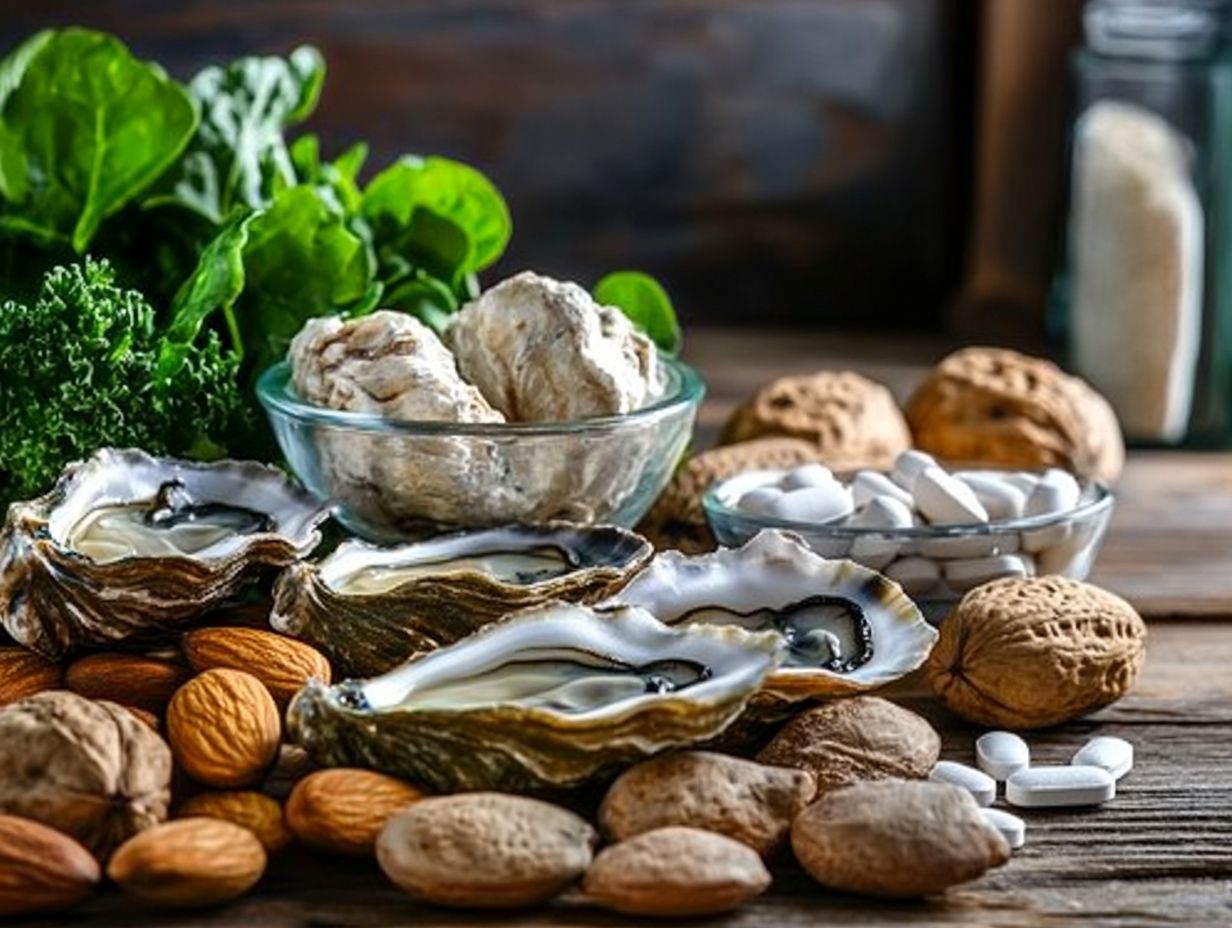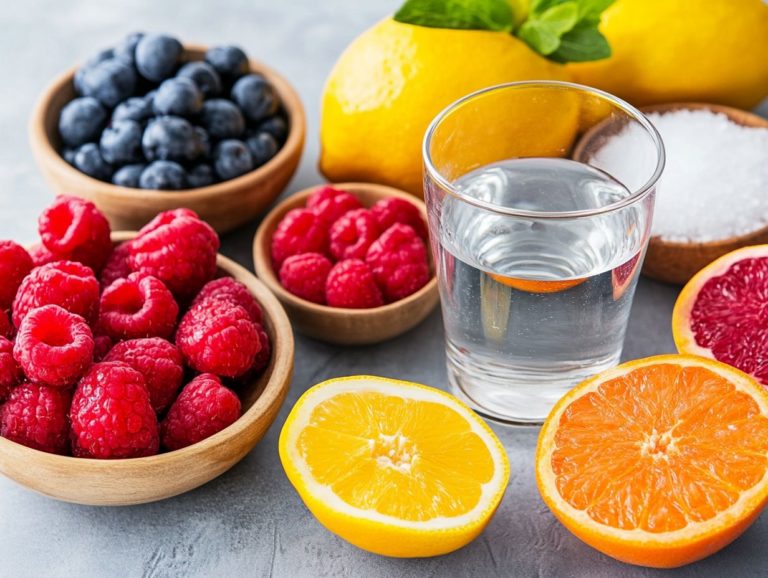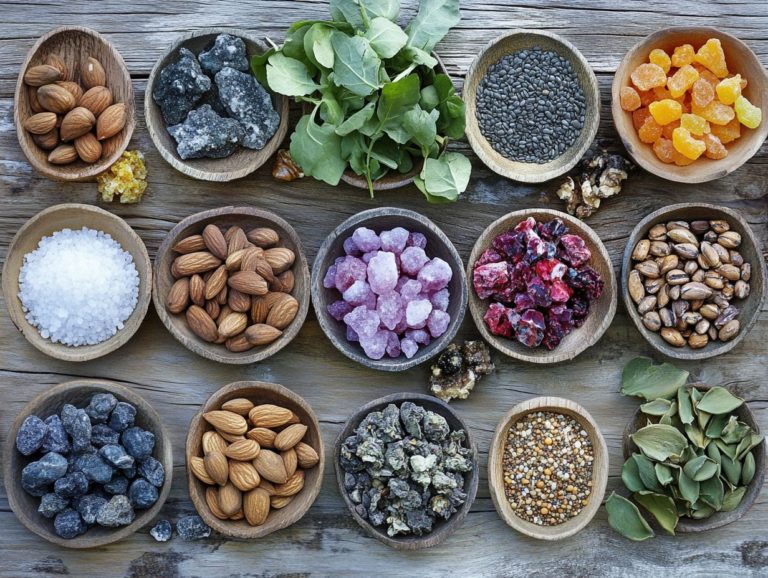The Importance of Zinc for Immune Function
Zinc is an incredibly powerful mineral that plays a vital role in maintaining your overall health, particularly in supporting your immune function. Its importance goes well beyond just boosting your immune response; it influences various essential bodily processes.
This article delves into what zinc is and why it s crucial for you, the potential consequences of zinc deficiency, and how it can impact your immunity and disease risk.
You ll also discover the best dietary sources of zinc, explore supplementation options, and learn the recommended daily intake along with tips for enhancing zinc absorption. By understanding these facets, you ll be equipped to make informed choices that promote your health.
Contents
Key Takeaways:

Zinc plays a crucial role in immune function by aiding in the production and function of immune cells. Zinc deficiency can weaken the immune response and increase the risk of infections and diseases. Consuming zinc-rich foods or taking supplements can help maintain adequate zinc levels and support a strong immune system.
What is Zinc and Why is it Important?
Zinc is an essential trace mineral that plays a critical role in many physiological processes within your body. This vital nutrient is fundamental for maintaining optimal immune function, promoting effective wound healing, and supporting chemical reactions that help your body function.
Zinc also protects against age-related degeneration, significantly enhancing your quality of life as you age. Its importance goes beyond basic nutrition; it directly impacts your body s ability to fight off diseases and sustain overall health, positioning it as a cornerstone in nutritional science.
Overview of Zinc’s Role in the Body
Zinc is a multifaceted mineral that is essential for various bodily functions, including immune response, taste, and smell.
This vital nutrient serves as a powerful ally for your immune system, enhancing your body’s ability to fend off infections and illnesses effectively.
Zinc is also crucial for wound healing, facilitating the repair of skin ulcers and other injuries. A deficiency can lead to a diminished ability to taste and smell, which affects not just your enjoyment of food but also your overall nutrition.
Furthermore, zinc is integral to metabolism, ensuring that your body efficiently converts food into energy and maintains optimal health.
Zinc Deficiency and Immune Function
Zinc deficiency poses a considerable health risk, significantly undermining your immune function and heightening your vulnerability to infections and diseases.
Recognizing the importance of zinc is essential for your health!
Impact on Immune Response and Disease Risk

The impact of zinc deficiency on your immune response can lead to an increase in cold symptoms and a greater risk of various diseases. Zinc is an essential mineral that plays a pivotal role in numerous bodily functions, particularly in bolstering your immune system.
When your levels are insufficient, you may find yourself battling frequent colds and facing heightened vulnerability to infections as your defense against pathogens weakens. Symptoms of zinc deficiency can manifest as fatigue, delayed wound healing, and alterations in taste or smell.
Research estimates that around 2 billion people worldwide are zinc deficient, with many experiencing an elevated risk of illness. Studies have demonstrated that zinc supplementation can shorten the duration and severity of cold symptoms, underscoring the importance of maintaining optimal zinc levels for your overall health.
Sources of Zinc
Zinc is readily available from a diverse array of dietary sources, including both food and supplements. This accessibility gives you the power to easily meet your nutritional needs and support your overall health.
Foods High in Zinc
Discover a treasure trove of delicious foods rich in zinc! This essential mineral can easily be woven into your balanced diet.
This vital nutrient is plentiful in various sources. Succulent seafood like oysters and crab are celebrated for their exceptionally high zinc content.
Meats such as beef, pork, and lamb are also excellent providers of this essential mineral. They play a crucial role in maintaining your optimal health.
If you lean towards plant-based options, legumes like lentils and chickpeas serve as fantastic alternatives. Fortified cereals conveniently boost your daily zinc intake.
By consistently including these zinc-rich foods in your meals, you can significantly reduce the risk of deficiency. This supports your immune system, wound healing, and overall cellular function.
Supplementation Options
When dietary sources fall short, zinc supplementation offers a reliable alternative to help you achieve adequate intake.
Among the various forms of zinc supplements available, oral options like zinc gluconate or zinc picolinate are the most commonly used. They are incredibly convenient for your daily routine.
If you’re seeking quicker absorption, intranasal zinc is a viable choice. It is often employed to combat common colds or nasal infections.
Each form presents unique benefits. Oral supplements are excellent for maintaining consistent daily levels, while intranasal options can deliver relief in a flash.
It’s essential to follow recommended dosages closely. This helps you steer clear of potential side effects such as gastrointestinal discomfort or changes in taste.
When selecting the right form of supplementation, consider your individual health needs and lifestyle. This ensures optimal effectiveness.
Recommended Daily Intake of Zinc

The recommended daily intake of zinc varies based on factors such as age, sex, and life stage. Addressing your specific nutritional requirements is significant.
It’s essential to tailor your diet to meet these distinct needs. This ensures optimal health and well-being.
Factors Affecting Zinc Requirements
Several factors influence your zinc requirements, including age, how your body processes food, and overall health.
As you age, your body’s ability to absorb essential nutrients may decline. This means you might need a higher intake of zinc to support immune function and cellular health.
Chronic health conditions can increase your need for zinc. Your body may work overtime to heal, making you more susceptible to deficiency.
To ensure you’re getting enough zinc, it’s wise to incorporate a variety of zinc-rich foods into your diet, such as:
- Lean meats
- Shellfish
- Legumes
- Seeds
- Whole grains
Considering supplements can also be beneficial, particularly if you’re at a higher risk of deficiency. Just be sure to consult your healthcare provider to tailor your intake to your specific health needs.
Ways to Improve Zinc Absorption
Enhancing zinc absorption is vital for reaping the full benefits of this essential mineral. There are numerous strategies you can employ to optimize its uptake within your body.
Optimizing Zinc Uptake in the Body
Optimizing zinc uptake can significantly enhance your immune function and overall health. It is essential to grasp the best practices for this.
One effective strategy is to incorporate zinc-rich foods into your daily meals. Prioritize options like:
- Lean meats
- Shellfish
- Legumes
- Nuts
- Whole grains
Timing is crucial as well. Consuming zinc during meals can enhance absorption, especially when paired with protein.
If you re considering supplements, opt for formulations that include chelated forms of zinc. These are nutrients bound with other substances to improve absorption.
A balanced diet supports your zinc intake while delivering other essential nutrients. This highlights the importance of a holistic approach to nutrition.
Frequently Asked Questions

Boost your immune system and energy levels by including these foods today! Don’t wait start incorporating these foods now!
Consult your healthcare provider for personalized advice on zinc intake.
What is the role of zinc in immune function?
Zinc is a vital mineral that supports a healthy immune system. It helps produce immune cells, like white blood cells and antibodies, which protect the body from harmful germs.
How does zinc deficiency affect the immune system?
A lack of zinc can weaken the immune system. It reduces the production and effectiveness of immune cells, making you more vulnerable to infections and illnesses.
What are the signs of zinc deficiency?
Common signs of zinc deficiency include frequent colds, slow wound healing, hair loss, and dull skin. If you notice these symptoms, check your zinc levels with a healthcare professional.
What are some food sources of zinc?
Zinc is found in foods like oysters, beef, chicken, nuts, seeds, and legumes. Eating a balanced diet rich in these foods can help ensure you get enough zinc for strong immune health.
Can taking zinc supplements boost immune function?
Zinc supplements can help those with a deficiency, but they won t significantly improve immune function in healthy people. It’s best to obtain nutrients from whole foods instead of relying on supplements.
How much zinc is needed for optimal immune function?
Adults should aim for 8-11 mg of zinc daily for women and 11-14 mg for men. Pregnant and breastfeeding women may require more. Consult a healthcare professional to find the right amount for you.






